The Lion in Winter is a 1966 play by James Goldman, depicting the personal and political conflicts of Henry II of England, his wife Eleanor of Aquitaine, their children and their guests during Christmas 1183. It premiered on Broadway at the Ambassador Theatre on March 3, 1966, starring Robert Preston and Rosemary Harris, who won a Tony Award for her portrayal of Eleanor. It was adapted by Goldman into an Academy Award-winning 1968 film of the same name, starring Peter O'Toole and Katharine Hepburn. The play has been produced numerous times, including Broadway and West End revivals.

Suspicion is a 1941 romantic psychological thriller film noir directed by Alfred Hitchcock and starring Cary Grant and Joan Fontaine as a married couple. It also features Sir Cedric Hardwicke, Nigel Bruce, Dame May Whitty, Isabel Jeans, Heather Angel, and Leo G. Carroll. Suspicion is based on Francis Iles's novel Before the Fact (1932).

Dame Olivia Mary de Havilland was a British-American actress. The major works of her cinematic career spanned from 1935 to 1988. She appeared in 49 feature films and was one of the leading actresses of her time. At the time of her death in 2020 at age 104, she was the oldest living and earliest surviving Academy Award winner and was widely considered as being the last surviving major star from the Golden Age of Hollywood cinema. Her younger sister was Oscar-winning actress Joan Fontaine.

Joan de Beauvoir de Havilland, known professionally as Joan Fontaine, was a British-American actress who is best known for her starring roles in Hollywood films during the "Golden Age". Fontaine appeared in more than 45 films in a career that spanned five decades. She was the younger sister of actress Olivia de Havilland. Their rivalry was well-documented in the media at the height of Fontaine's career.

Rose Joan Blondell; August 30, 1906 – December 25, 1979) was an American actress who performed in film and television for 50 years.

Marie Adelaide Elizabeth Rayner Lowndes, who wrote as Marie Belloc Lowndes, was a prolific English novelist, and sister of author Hilaire Belloc.

Rebecca is a 1940 American romantic psychological thriller film directed by Alfred Hitchcock. It was Hitchcock's first American project, and his first film under contract with producer David O. Selznick. The screenplay by Robert E. Sherwood and Joan Harrison, and adaptation by Philip MacDonald and Michael Hogan, were based on the 1938 novel of the same name by Daphne du Maurier.

Island in the Sun is a 1957 drama film produced by Darryl F. Zanuck and directed by Robert Rossen. It features an ensemble cast including James Mason, Harry Belafonte, Joan Fontaine, Joan Collins, Dorothy Dandridge, Michael Rennie, Stephen Boyd, Patricia Owens, John Justin, Diana Wynyard, John Williams, and Basil Sydney. The film is about race relations and interracial romance set in the fictitious island of Santa Marta. Barbados and Grenada were selected as the sites for the movie based on the 1955 novel by Alec Waugh. The film was controversial at the time of its release for its on-screen portrayal of interracial romance.

The Emperor Waltz is a 1948 American musical film directed by Billy Wilder, and starring Bing Crosby and Joan Fontaine. Written by Wilder and Charles Brackett, the film is about a brash American gramophone salesman in Austria at the turn of the twentieth century who tries to convince Emperor Franz Joseph to buy a gramophone so the product will gain favor with the Austrian people. The Emperor Waltz was inspired by a real-life incident involving Franz Joseph I of Austria. Filmed in Jasper National Park in Canada, the picture premiered in London, Los Angeles, and New York in the spring of 1948, and was officially released in the United States July 2, 1948. In 1949, the film received Academy Award nominations for Best Costume Design and Best Music, as well as a Writers Guild of America Award nomination for Best Written American Musical.
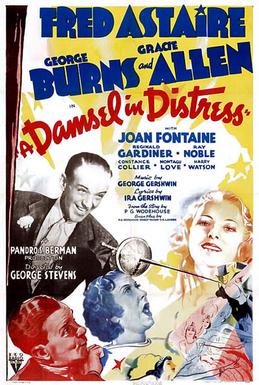
A Damsel in Distress is a 1937 English-themed Hollywood musical comedy film starring Fred Astaire, George Burns, Gracie Allen and Joan Fontaine. Loosely based upon P.G. Wodehouse's 1919 novel of the same name, and the 1928 stage play written by Wodehouse and Ian Hay, it has music and lyrics by George and Ira Gershwin, and was directed by George Stevens, the second Astaire musical directed by Stevens; the first was Swing Time.
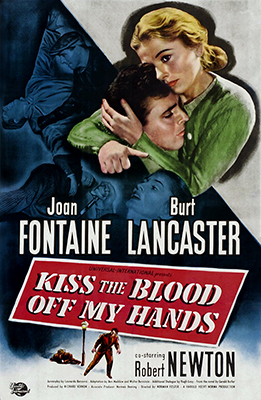
Kiss the Blood Off My Hands is a 1948 American noir-thriller film directed by Norman Foster. Based on the best-selling novel of the same name by Gerald Butler, it stars Joan Fontaine, Burt Lancaster and Robert Newton. The film faced minor opposition from fundamentalist groups in the United States and the Commonwealth, with regards to its gory title. In some markets, the film was released under the alternate title The Unafraid or Blood on My Hands.

The Stud is a 1978 British drama film directed by Quentin Masters and starring Joan Collins and Oliver Tobias. It is based on the 1969 novel of the same name by Collins' younger sister Jackie Collins.
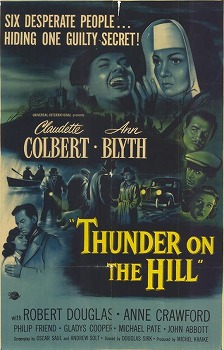
Thunder on the Hill is a 1951 American film noir crime film directed by Douglas Sirk and starring Claudette Colbert and Ann Blyth. The picture was made by Universal-International Pictures and produced by Michael Kraike from a screenplay by Oscar Saul and Andrew Solt, based on the play Bonaventure by Charlotte Hastings. The music score was by Hans J. Salter and the cinematography by William H. Daniels.

Something to Live For is a 1952 American drama film starring Joan Fontaine, Ray Milland, and Teresa Wright, directed by George Stevens, and released by Paramount Pictures. The screenplay by Dwight Taylor was the first to focus on the Alcoholics Anonymous program as a means of overcoming an addiction to liquor.
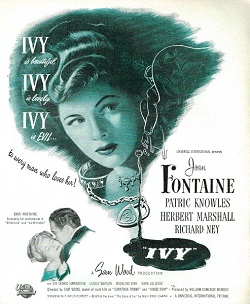
Ivy is a 1947 American crime film directed by Sam Wood and written by Charles Bennett, based on the 1927 novel The Story of Ivy by Marie Adelaide Belloc Lowndes. The drama features Joan Fontaine, Patric Knowles, Herbert Marshall and Richard Ney. The film was entered into the 1947 Cannes Film Festival.
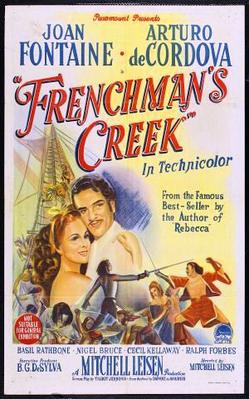
Frenchman's Creek is a 1944 adventure film adaptation of Daphne du Maurier's 1941 novel of the same name, about an aristocratic English woman who falls in love with a French pirate. The film was released by Paramount Pictures and starred Joan Fontaine, Arturo de Córdova, Basil Rathbone, Cecil Kellaway, and Nigel Bruce. Filmed in Technicolor, it was directed by Mitchell Leisen. The musical score was by Victor Young, who incorporated the main theme of French composer Claude Debussy's Clair de Lune as the love theme for the film.

September Affair is a 1950 American romantic drama film directed by William Dieterle and starring Joan Fontaine, Joseph Cotten, and Jessica Tandy. It was produced by Hal B. Wallis.

Ivy Lilian Close was a British actress. She acted in 44 films between 1912 and 1929.

The Man Who Found Himself, also known as Wings of Mercy, is a 1937 American aviation film based on the unpublished story "Wings of Mercy" by Alice B. Curtis. The film marked the first starring role for 19-year-old Joan Fontaine, who was billed as the "new RKO screen personality", highlighted following the end of the film by a special "on screen" introduction. Unlike many of the period films that appeared to glorify aviation, it is a complex film, examining the motivations of both doctors and pilots.
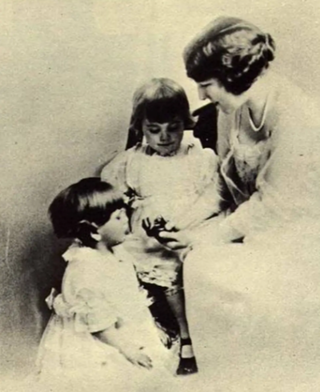
Lilian Augusta Fontaine was an English actress and mother of Olivia de Havilland and Joan Fontaine.
















